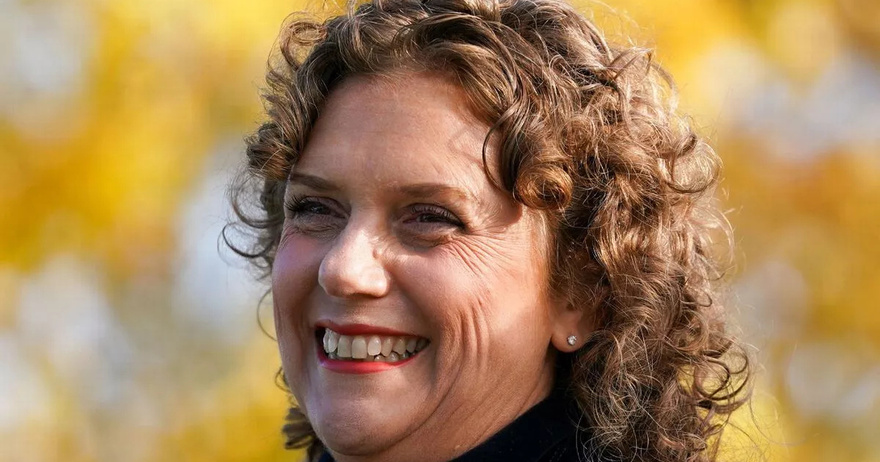A damning report has made a series of bombshell claims against the family of hero Covid-19 fundraiser Captain Sir Tom Moore.
The Charity Commission inquiry found his daughter Hannah Ingram-Moore, 53, and her husband, Colin, 66, pocketed over £1m in his name. It said they gained a “significant” financial benefit from links to a charity set up during the pandemic.
The report said a probe of The Captain Tom Foundation had uncovered “repeatedly failures of governance and integrity”.
World War II hero Sir Tom raised nearly £39 million by walking 100 lengths of his garden ahead of his 100th birthday. His fundraising efforts captured the nation’s hearts and led to a record- breaking flood of donations from well-wishers.
He was given a BBC Sports Personality of the Year award and performed in a chart-topping music single. Sir Tom was knighted by the Queen in July 2020 and died, aged 100, in February 2021 after contracting Covid-19.
The Captain Tom Foundation was set up by his daughter Hannah and her husband Colin in his honour. But it became the subject of several allegations, leading to Charity Commission and Fundraising Regulator investigations.
The Charity Commission first opened a compliance case in March 2021 and began reviewing the set-up of the organisation. It opened a statutory inquiry – usually reserved for only the most serious cases – in June 2022. Now the watchdog’s report has been published – and is damning in its criticism of Hannah Ingram-Moore and her husband Colin. Here
The Book Deal
The report revealed sales of Captain Tom’s autobiography ‘Tomorrow Will Be A Good Day’ did not benefit The Captain Tom Foundation.
In the book’s prologue he wrote of being given “the chance to raise even more money for the charitable foundation now established in my name.” But instead an advance of £1.4m for the three-book deal was paid to Club Nook – a company of which the Ingram-Moore’s are directors.
Literary agent Bev James, who represented Captain Tom, said the couple were “very clear” they did not want the money to go to charity.
The Commission said that “to date the charity has not received any money from the first publishing agreement”. It said the public “would understandably feel misled” to learn that the charity did not benefit from the book sales. The report said their failure to honour the donation “has seriously damaged the reputation of the charity”.
Charity Commission bosses have now called on the Ingram-Moores to make a “suitable donation”.
The £200,000 spa block
The commission criticised the couple for using the foundation’s name in a planning application for a spa pool block at their Bedfordshire home. Mrs Ingram-Moore and her husband said it had been an error which they blamed on being busy “undertaking global media work”.
Planners gave “significant weight… to the fact that the charity was to use the proposed building for its charitable purposes,” the report said. But the £200,000 block was demolished earlier this year after a revised planning application did not feature the word “charity” or “foundation”. The report authors said evidence suggests the couple “were using the charity and its name inappropriately for their private benefit”.
Mrs Ingram-Moore personally pocketed an £18,000 fee for appearing at an awards ceremony. Just £2,000 was donated to the charity after she claimed her appearance at the Virgin Media Awards was undertaken in a personal capacity.
The report said “the inquiry does not agree with Mrs Ingram-Moore’s assertion that this was something that she undertook in her personal capacity”. It added: “There is no evidence to suggest that this work was done outside her contracted work hours, or that annual leave was booked to undertake the role”.
The Salary
It said there was evidence Mrs Ingram-Moore set out expectations for a £150,000 salary before becoming the charity’s chief executive.
Rights Row
Charity commission bosses criticised confusion over the handling of intellectual property rights. The report said those rights were owned by the family but offered to the foundation to use without appropriate agreements in place. This led to possible financial losses to the charity, it stated.
Explosive Criticism
Charity Commission chief executive David Holdsworth said the foundation had “not lived up to that legacy of others before self, which is central to charity”. He said the Ingram-Moores had failed to “make an unambiguous distinction between their personal interests and those of the charity and the beneficiaries they are there to serve”.
“We found repeated instances of a blurring of boundaries between private and charitable interests, with Mr and Mrs Ingram-Moore receiving significant personal benefit,” he added. “Together the failings amount to misconduct and/or mismanagement.”
A spokesperson for the Captain Tom Foundation said: “The Captain Tom Foundation is pleased with the Charity Commission’s unequivocal findings regarding the Ingram-Moores’ misconduct. We join the Charity Commission in imploring the Ingram-Moores to rectify matters by returning the funds due to the Foundation, so that they can be donated to well-deserving charities as intended by the late Captain Sir Tom Moore. We hope they do so immediately and without the need for further action.”
The Ingram-Moores said they felt “unfairly and unjustly” treated and accused the commission of “selective storytelling”. They said: “A credible regulatory body would provide the full truth, rather than misrepresenting, and conflating facts and timelines that align with a predetermined agenda.
“True accountability demands transparency, not selective storytelling.” They said the inquiry had taken a “serious toll on our family’s mental and physical health, unfairly tarnishing our name and affecting our ability to carry on Captain Sir Tom’s legacy”.
Wendy’s Reacts to Backlash Over Joke About Leaving Katy Perry in Space: ‘Always Bring a Little Spice’
Michael Bublé Is Living The Good Life With His Family In A Multi-Million Dollar Mansion In His Hometown.
Dolly Parton’s best duet yet: ‘There Was Jesus’
Grooving Groom Daniel Lewis’s Epic Dance Entrance With His Boys Makes Wedding Goes Viral.
